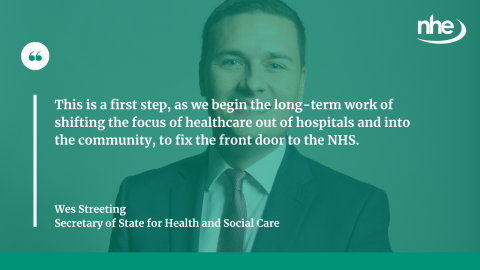In what the government has described as an “emergency measure”, changes to the Additional Roles Reimbursement Scheme are set to open the door for the recruitment of over 1,000 GPs, the Department of Health and Social Care (DHSC) has confirmed.
Under current rules, the scheme allows primary care networks to claim reimbursement for the salaries of 17 new roles within multidisciplinary teams. This includes paramedics, physician associates, and clinical pharmacists but does not extend to GPs.
The changes announced today by the DHSC mean that hundreds of newly qualified GPs will be able to enter the NHS workforce via this route in 2024/25.
“This is a first step, as we begin the long-term work of shifting the focus of healthcare out of hospitals and into the community, to fix the front door to the NHS,” said health secretary Wes Streeting. Restoring the ‘family doctor’ and investing resources further upstream were staples of the Labour manifesto during the election campaign.

The government has said that this is only a short-term measure and that it will work with general practice to identify long-term solutions to unemployment and sustainability as part of the next fiscal event.
NHS England’s national primary care director, Dr Amanda Doyle, said: “Adding general practitioners to the scheme is something that the profession has been calling for in recent months to make it easier for practices to hire more staff — so I welcome this measure which is an important first step to increasing GP employment in the long term.”
She added: “With hard-working GP teams delivering millions more appointments a month compared to before the pandemic, it is vital they are given the resources to manage this increase in demand.”
The Royal College of GPs’ (RCGP) chair, Professor Kamila Hawthorne, has previously said the pace at which GPs are delivering appointments is unsustainable — especially given the smaller workforce. A study conducted by the RCGP suggested that three-quarters (76%) of GPs believe their excessive workloads are compromising patient safety.
Nearly 10,000 GPs signed an open letter to Wes Streeting last week urging him to review the NHS Long Term Workforce Plan in order to address the issues present in the GP profession.
In the same vein, the news comes on the same day the British Medical Association (BMA) votes firmly in favour of collective action in opposition of the 2024/25 GP contract. Therefore, for an indefinite amount of time, GPs can choose from a list of 10 actions and implement as many, or as few, as they like.
Actions include:
- refusing to share patient data unless it is in their best interest;
- circumventing referral protocol; and
- switching off NHS software.
Chair of the BMA’s GP committee for England, Dr Katie Bramall-Stainer, said: “We had a huge response to this ballot, and the results are clear — GPs are at the end of their tether. This is an act of desperation. For too long, we’ve been unable to provide the care we want to. We are witnessing general practice being broken.”
She added: “We don’t want to have to take this next step but must if we’re to stop our services from collapsing completely. A key Labour manifesto promise was to bring back the family doctor, and we look forward to making sure that can become a reality as soon as possible.”
The BMA ballot received a 98.3% ‘yes’ rate from just over 8,500 votes.
“It is disappointing that GPs have had to take these drastic steps to secure a fair funding deal,” said the NHS Confederation’s CEO, Matthew Taylor.
“We urge the government and the BMA’s GP Committee to work together to find solutions to avert this action in the interest of patients.”
The Nuffield Trust’s research and policy director, Dr Becks Fisher, described the news as a “watershed moment” for the health service.
“Unlike other recent NHS staff strikes, this isn’t primarily about the pay of individual GPs. In recent years, the amount of money GPs are given to provide care for their patients has been lagging behind patient demand and hasn’t kept up with inflation,” said Dr Fisher. “GPs hate feeling that they aren’t able to provide the high quality care that patients deserve.”
She added: “This ballot result coincides with a significant government announcement on additional funding to employ new GPs. That funding is welcome — and GPs will be considering their positions in light of the news. GPs and government must work together to restore general practice as a stable foundation for the NHS.”
Image credit: iStock



















